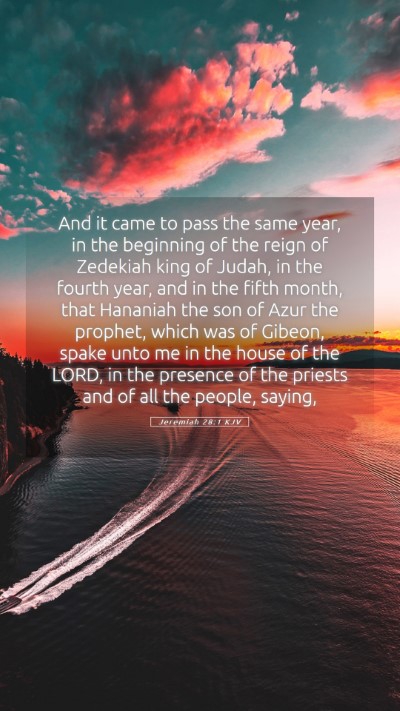Understanding Jeremiah 28:1
Bible Verse: Jeremiah 28:1
This passage takes place in the fourth year of King Zedekiah's reign over Judah, when the prophet Jeremiah encounters Hananiah, a false prophet who presents a contradictory message about Judah's fate.
Verse Context
In this chapter, we see the struggle between true and false prophecy in the context of Israel's impending exile. Jeremiah represents the true prophetic voice warning of consequences for the nation's unfaithfulness, while Hananiah declares that God's judgment will be lifted shortly, providing false hope.
Commentary Insights
Matthew Henry's Commentary
- Setting the Scene: Jeremiah's communication with Hananiah highlights the confusion among the people regarding God's message.
- Contradiction: Hananiah's declaration of peace stands in stark contrast to Jeremiah's warning of destruction, creating a theological conflict.
- False Prophecy: Henry underscores the importance of discerning true prophecy from false promises, emphasizing that the consequences of ignoring truth can be severe.
Albert Barnes' Notes
- Prophetic Authority: Barnes points out that the source of a prophet's message determines its validity. Jeremiah’s role is to convey God's actual intent, while Hananiah shows an appeal to popular desire.
- Historical Insight: The historical context reveals Judah’s precarious state, with oppression from Babylon looming, which amplifies the importance of understanding prophetic declarations.
- Contrast between Prophets: The contrast between Jeremiah and Hananiah serves as a lesson for future generations on the necessity of assessing the spiritual integrity of leaders and their messages.
Adam Clarke's Commentary
- Messages of Hope vs. Reality: Clarke emphasizes the differing messages of hope versus reality. While Hananiah's message sounds appealing, it is essential to align expectations realistically.
- Call to Discernment: He implores readers to focus on true spiritual guidance, highlighting the benefits of studying scripture to avoid falling for false teachings.
- Character of Prophets: Clarke discusses the importance of the character and motives of prophets, suggesting that true prophets will not seek their own glory but the glory of God alone.
Summary of Biblical Exegesis
Overall, Jeremiah 28:1 serves as a critical reminder of the need for vigilance against misleading teachings. True prophecy is rooted in God’s word, and readers are encouraged to engage in Bible study insights and scripture analysis to understand the meaning of Bible verses accurately.
Application in Life
In applying this scripture to daily life, believers are called to seek discernment actively. Understanding difficult Bible passages often requires a deeper examination of both the historical context and the overarching themes within scripture.
Cross References
- Jeremiah 14:14: Highlights the distinction between God’s true messages and deceptive prophecies.
- Deuteronomy 18:20-22: Discusses the test of a true prophet in relation to the fulfillment of their prophecies.
- 1 Kings 22:23: Another instance illustrating the consequences of false prophecy.
Further Study Resources
For those looking to delve deeper, consider the following Bible study tools and resources:
- Bible study groups
- Online Bible study courses
- Bible study guides
Conclusion
Jeremiah 28:1 illuminates the ongoing struggle to discern God's voice amid conflicting messages. As readers engage in Bible verse interpretations and strive for understanding Scripture, it is imperative to develop a relationship with the divine through prayer, study, and community.


